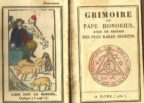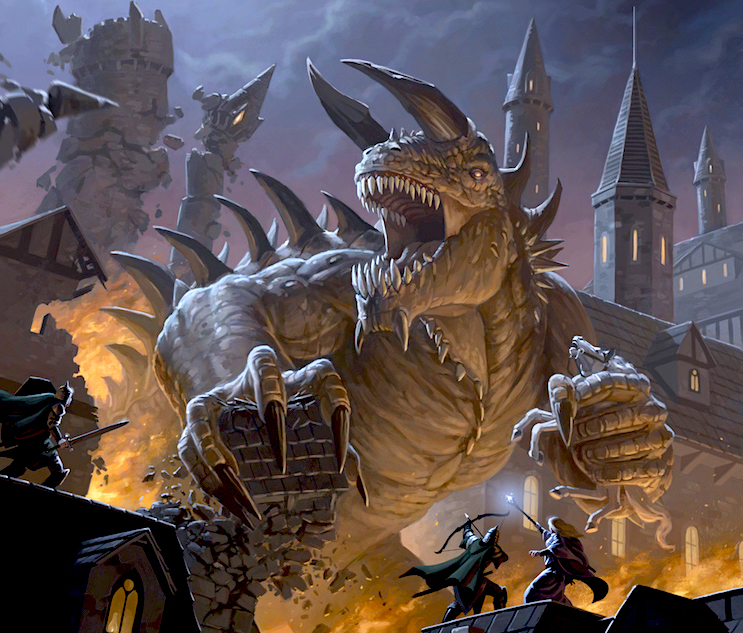I think I have established I love spell books. The spell book is an integral part of the wizardry motif. The book, the object, is a needed part of what wizards do in D&D. The current rules do require you to record your spells, but I do think it could be even more emphasized.
Learning Spells
First, let’s look at learning spells. As it stands right now, you learn spells automatically. You just pick a couple of spells you know for free. This is fine and proper at the early levels, but you lose that quest for the spells aspect of being a wizard. What that needs is a mechanic making it not free for all spells.
My buddy, Brandes Stoddard, of Harbinger of Doom fame, suggested the simple solution that all spells not in the player’s handbook need to be learned or researched. If it is a third party or later supplement, then you don’t get that one for free. That has the advantage of being efficient and easy to understand. I think I would go a step further.
I would have a list of spells which are free, but the higher you go in level, the less spells there are on that list. There would be no 9th level free spells. That level of power requires a quest to learn, or a lot of research. Wish alone is something you should have to quest for.
My chart might look like this.
Common (don’t require anything more than the spell learning rules listed in the PHB)
Cantrips (0 level)
Acid Splash, Chill Touch, Dancing Lights, Fire Bolt, Light, Mage Hand, Mending, Message, Minor Illusion, Poison Spray, Prestidigitation, Ray of Frost, Shocking Grasp, True Strike
1st Level
Alarm, Burning Hands, Charm Person, Color Spray, Comprehend Languages, Detect Magic, Disguise Self, Expeditious Retreat, False Life, Feather Fall, Find Familiar, Floating Disk, Fog Cloud, Grease, Hideous Laughter, Identify, Illusory Script, Jump, Longstrider, Mage Armor, Magic Missile, Protection from Evil and Good, Shield, Silent Image, Sleep, Thunderwave, Unseen Servant
2nd level
Acid Arrow, Alter Self, Arcane Lock, Arcanist’s Magic Aura, Blindness/Deafness, Blur, Continual Flame, Darkness, Darkvision, Detect Thoughts, Enlarge/Reduce, Flaming Sphere, Gentle Repose, Gust of Wind, Hold Person, Invisibility, Knock, Levitate, Locate Object, Magic Mouth, Magic Weapon, Mirror Image, Misty Step, Ray of Enfeeblement, Rope Trick, Scorching Ray, See Invisibility, Shatter, Spider Climb, Suggestion, Web
3rd level
Animate Dead, Bestow Curse, Blink, Clairvoyance, Counterspell, Dispel Magic, Fear, Fireball, Fly, Gaseous Form, Glyph of Warding, Haste, Hypnotic Pattern, Lightning Bolt, Magic Circle, Major Image, Nondetection, Phantom Steed, Protection from Energy, Remove Curse, Sending, Sleet Storm, Slow, Stinking Cloud, Tiny Hut, Tongues, Vampiric Touch, Water Breathing
4th level
Arcane Eye, Banishment, Black Tentacles, Blight, Confusion, Conjure Minor Elementals, Control Water, Dimension Door, Fabricate, Faithful Hound, Fire Shield, Greater Invisibility, Hallucinatory Terrain, Ice Storm, Locate Creature, Phantasmal Killer, Polymorph, Private Sanctum, Resilient Sphere, Secret Chest, Stone Shape, Stoneskin, Wall of Fire
5th level
Animate Objects, Arcane Hand, Cloudkill, Cone of Cold, Creation, Dominate Person, Dream, Hold Monster, Legend Lore, Mislead, Passwall, Planar Binding, Scrying, Seeming, Telekinesis, Telepathic Bond, Teleportation Circle, Wall of Force, Wall of Stone
6th level
Chain Lightning, Eyebite, Flesh to Stone, Freezing Sphere, Instant Summons, Mass Suggestion, Move Earth, Programmed Illusion, Sunbeam, True Seeing, Wall of Ice
7th Level
Symbol, Teleport
8th Level
Power Word Stun
Uncommon (requires copying an existing copy or some sort of downtime research)
5th Level
Conjure Elemental, Contact Other Plane, Geas, Modify Memory
6th level
Circle of Death, Contingency, Create Undead, Disintegrate,
Globe of Invulnerability, Guards and Wards, Irresistible Dance, Magic Jar
7th level
Arcane Sword, Delayed Blast Fireball, Etherealness, Finger of Death, Forcecage, Magnificent Mansion, Mirage Arcane, Plane Shift, Prismatic Spray, Project Image, Reverse Gravity, Sequester, Simulacrum
8th level
Antimagic Field, Antipathy/Sympathy, Clone, Control Weather, Demiplane, Dominate Monster, Feeblemind, Incendiary Cloud, Maze, Mind Blank, Sunburst
Rare (Must be learned from an existing source or some epic quest or both)
9th level
Astral Projection, Foresight, Gate, Imprisonment, Meteor Swarm, Power Word Kill, Prismatic Wall, Shapechange, Time Stop, True Polymorph, Weird, Wish
You will notice I started the transition at 5th level. You could start lower if you wanted even more focus on collecting books. My solution would be to put all the 3rd party spells on the Uncommon list, as well. Then there is a reason to collect spell books throughout the character progression. I used the SRD spells in this example for simplicity.
The Book Itself
What else can we look at to make spell books more interesting. We can make more magic spell books, with some minor effects to make you better at your spell casting. Maybe any spell stored in a book etched on ebony plates make your save DC +2, or lets you have advantage in some sort of test.
Also, listing a book based magic item should include what spells are stored within it. Finding a magic tome with a spell you did not already have should be an added advantage. You might also have a random chart to see what spells are within. Spellcasters may wish to switch over to the new spell book give its effects. Normal inscription costs for copying a new spell apply.
The object can be a source of power. This is just a rough idea, and maybe needs some refinement, but I will include some examples.
Example 1: The Ivory Tome
This book is so named due to the materials used in the binding. The stark white book is made of some sort of ivory, though what animal supplied the ivory is unknown. The pages of the book detail several spells, some of which are rare. It also possesses some formulae which enhance those spells. The formulae cannot easily be transferred or memorized, due to the mystical nature of the writing inscribing them.
Game Effect: If spells are memorized from this book have the added effect of healing caster 1 point per spell level cast. Cantrips do not have this effect.
Spells Found within:
Protection from Energy, Glyph of Warding, Private Sanctum, Geas, Telepathic Bond, Guards and Wards, and Time Stop
Example 2: Scrolls of Ignatius
The Wizard Ignatius Pyre was particularly fond of combat magics. He claimed, while living, to have invented the famous Fireball spell, and was insistent that his fellow wizards refer to the spell as the Conflagration of Pyre. His claims were of course patently false, but it is hard to deny his skill in fire based magic.
Game Effect: If a spell is memorized from these scrolls, and fire based, then the caster has advantage on any skill checks tied to the casting.
Spells Found Within:
Fire Bolt, Burning Hands, Continual Flame, Flaming Sphere, Scorching Ray, Fireball, Wall of Fire, Conjure Elemental, Delayed Blast Fireball, Incendiary Cloud, Meteor Swarm
The Book Club
Another thing that my pal Brandes suggested was letting other spellcasters in on the game. Why should wizards get all the fun in spell books? If you are running a campaign emphasizing the mystery and influence of magic, it makes sense that you put more emphasis on scholarship and tomes.
The Cleric is a bit easy. You just say they need the proper prayers or rites observed, and those are stored in their holy books. They pray for their spells, by conducting the properly recorded ritual. The book would be similar to a bible or book of common prayer.
The Sorcerer is a bit weirder, but they are very similar to wizards in theme and style. However, they are less apt to be based on their scholarship. Their power comes from their nature, so maybe having a spell book would have less benefit for them. Still, it is not a huge hardship to require them to keep their spells known in a book like a Wizard.
Warlocks…well they get their abilities by cutting deals with Powers. There are two ways you can go with your spell book here. The book could be could hold the Forbidden lore their pact gave them. Invocations must be inscribed to be maintained. The other option is that the book actually describes the rites they used to contact their patron. They don’t need it for day to day spell casting, but if they want to level and learn new magics, they need those rites.
The Druid is super hard to justify. Their power comes from the connection with nature. You could use talismans and fetishes in the place of spell books. The object can be read by someone in tune with nature. The mix of natural elements make it a book to those who know how to read them. Rangers would work much the same way.
Bards would work almost identically to Wizards, but they might have some music to pull those spells from. They memorize and sing spells from their song book.
There are a lot of ways you could go with it, but I think that works as a basic frame work. I would be interested to see what people thought of the idea, and if they would use it in their games. Do you make spell books important in your game?




Wow… so many good ideas to bring to my DungeonMaster for my wizard 😉
Thanks!